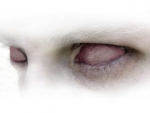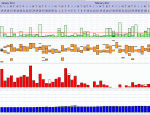brucifer wrote:
Furthermore, from studying my S9 graphs, how is my pulmonologist going to discern periods when I was awake from periods when I was asleep? How is the data generated by the S9 truly going to enlighten her in addressing my CPAP therapy?
Chances are you pulmonologist will never study the S9 graphs at all. She'll use the summary data to get a working
approximation of how well your therapy is working and she will combine that data with the subjective data based on your answers to questions like: How do you feel now? How would you rate the quality of your sleep these days? Have any of your symptoms returned? If things look good and you report things as going OK, she'll assume the machine is doing it job.
If the summary data looks iffy (the AHI is too high or the leak rate is too high), she may briefly examine a few overviews of whole night waveform data to see if the problem appears to be nasty clusters surrounded by periods of calm or whether the whole night seems to be "not great". If there are clusters, she'll probably assume they are REM or supine sleep related. In either case, if you tell her you think you are
sleeping at night and the number of CAs is small, she'll likely just prescribe a small increase in pressure and ask you to let her know if that doesn't help.
If the number of CAs is alarmingly high night after night and you report sleeping soundly with the machine, she won't spend any time analyzing the wave form from your machine; she'll use that data to justify bringing you back to the lab for another sleep study, most likely with an eye to doing a BiPAP ST or ASV titration.
Please understand, I'm not throwing the baby out with the bath water. I believe that CPAP therapy has a proven track record of being beneficial to patients. No argument from me there. Rather, I just question the validity and reliability of the data generated by the S9.
The machine AHI data is best understood as an approximation of the true AHI data, and as approximate data, the data is accurate enough for trending purposes. In other words, I'd never believe that Kaa gets my exact AHI right night after night. But if Kaa is consistently scoring so few events (real or false) that the computed AHI is less than 2.0 AND I'm feeling like I was asleep for 85-90% of the night most nights, I can safely assume that Kaa really is doing his job of preventing the vast majority of my events from taking place. And if Kaa suddenly started scoring enough events night after night that my AHI figures jumped to the 4.0 - 5.0 range and stayed there for a week or two AND I still thought I was asleep for 85-90 percent of the night, that would be enough data to warrant some further consultation with the sleep doc about what might need to be done.















